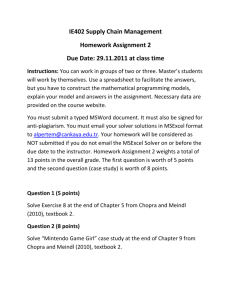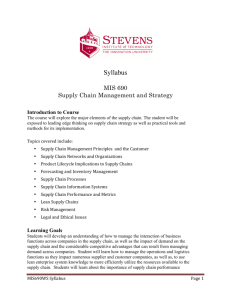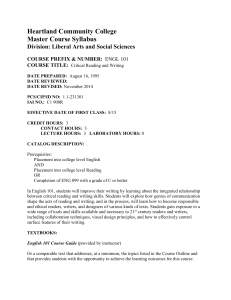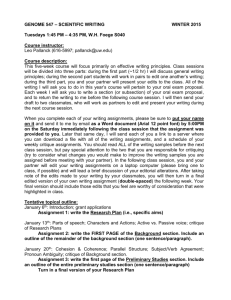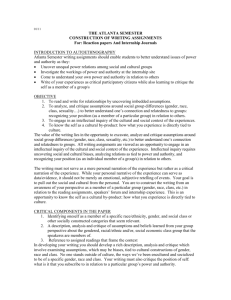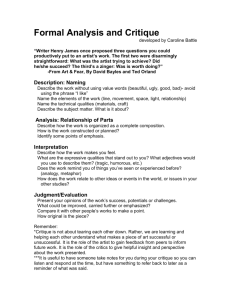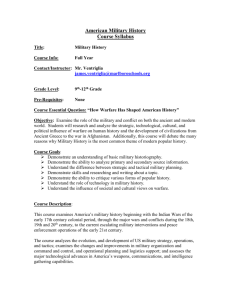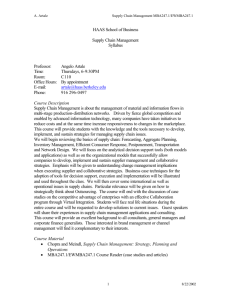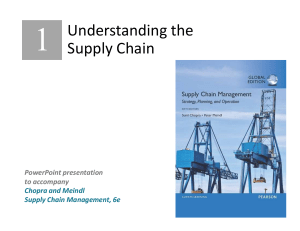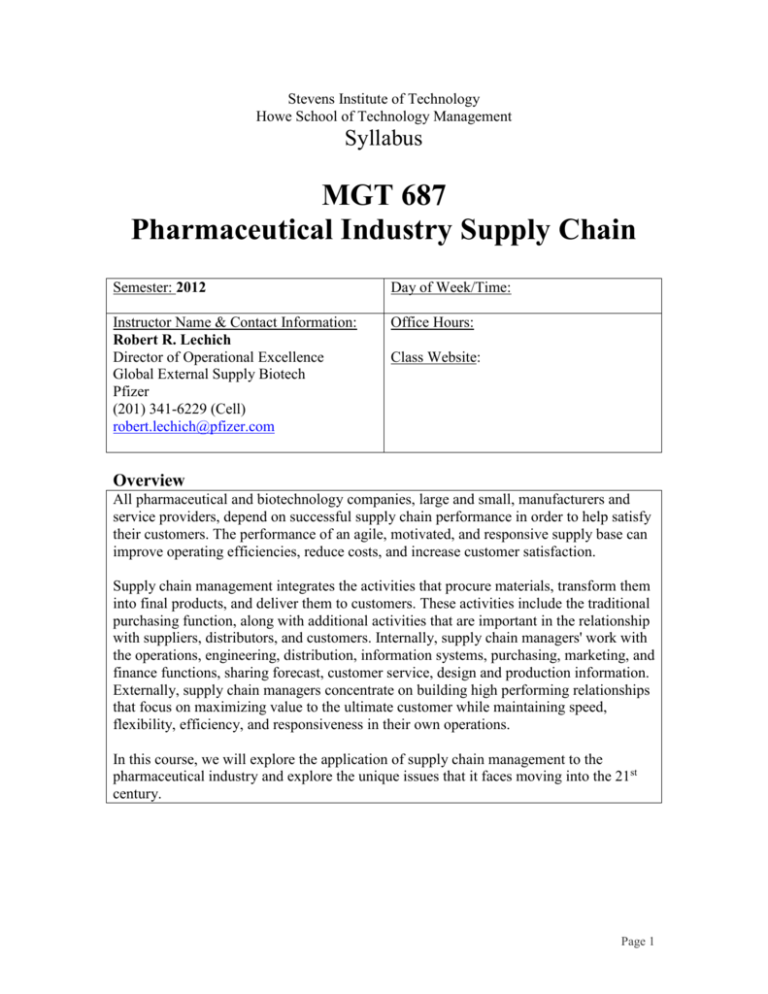
Stevens Institute of Technology
Howe School of Technology Management
Syllabus
MGT 687
Pharmaceutical Industry Supply Chain
Semester: 2012
Day of Week/Time:
Instructor Name & Contact Information:
Robert R. Lechich
Director of Operational Excellence
Global External Supply Biotech
Pfizer
(201) 341-6229 (Cell)
robert.lechich@pfizer.com
Office Hours:
Class Website:
Overview
All pharmaceutical and biotechnology companies, large and small, manufacturers and
service providers, depend on successful supply chain performance in order to help satisfy
their customers. The performance of an agile, motivated, and responsive supply base can
improve operating efficiencies, reduce costs, and increase customer satisfaction.
Supply chain management integrates the activities that procure materials, transform them
into final products, and deliver them to customers. These activities include the traditional
purchasing function, along with additional activities that are important in the relationship
with suppliers, distributors, and customers. Internally, supply chain managers' work with
the operations, engineering, distribution, information systems, purchasing, marketing, and
finance functions, sharing forecast, customer service, design and production information.
Externally, supply chain managers concentrate on building high performing relationships
that focus on maximizing value to the ultimate customer while maintaining speed,
flexibility, efficiency, and responsiveness in their own operations.
In this course, we will explore the application of supply chain management to the
pharmaceutical industry and explore the unique issues that it faces moving into the 21st
century.
Page 1
Introduction to Course
Students will develop an understanding of how to manage the interaction of business
functions across companies in the supply chain, as well as the impact of demand on the
supply chain and the considerable competitive advantages that can result from managing
demand across companies. Student will learn how to manage the operations and logistics
functions as they impact numerous supplier and customer companies, as well as, to use
lean enterprise system knowledge to more efficiently utilize the resources available to the
supply chain. Students will learn about the importance of supply chain performance
measurement and management, and how to use contemporary information tools to
support decision making in an integrated supply chain environment.
These objectives are carried out at a course level by a solid review of the theory base
associated with supply chain management, along with a discussion of advanced topics,
trends and directions. At a class level course topics are reviewed through a combination
of lecture, discussion, student project work, along with optional access to industry
speakers and site visits. Finally, each topic in the course is addressed through a
combination of assignments, case studies, exercises, and readings.
Topics covered include:
Supply Chain Management Principles and the Customer
Supply Chain Networks and Organizations
Product Lifecycle Implications to Supply Chains
Forecasting and Inventory Management
Supply Chain Processes
Supply Chain Information Systems
Supply Chain Performance and Metrics
Lean Supply Chains
Risk Management
Legal and Ethical Issues
Learning Goals
After taking this course, the student will be able to :
Understand how supply chain strategy can provide a competitive advantage for
pharmaceutical organizations.
Recognize supply chain approaches to support pharmaceutical products in different
phases of their lifecycle.
Analyze the balance between customer satisfaction level and inventory management
2
policies.
Integrate the role of manufacturing capabilities in pursuit of supply chain objectives.
Access supplier and distribution capabilities to provide value generating business
processes.
Design lean supply chains with the appropriate levels of risk.
Apply information systems to support collaboration and visibility of supply chains.
Pedagogy
This course will utilize readings, discussion questions and case studies to emphasize the
concepts of supply chain management as well as integrate the critical role of information
management. The course will also provide individual exams and a final paper for students
to demonstrate their knowledge and interests. Students are expected to use business
terminology to credibly present their work to a knowledgeable business audience.
Students are encouraged to understand both business and technology issues from the
perspective of senior business/technology managers.
Required Readings: Text(s)
Bowersox, Donald J., D. Closs, M. B. Cooper, Supply Chain Logistics Management,
McGraw-Hill Irwin, 2007, ISBN 9780072947885 (Excerpts Supplied by Professor)
Bell, Steven, Lean Enterprise Systems, John Wiley and Sons, Hoboken, New Jersey,
2006, ISBN 0471677841 (Excerpts Supplied by Professor)
Chopra, Sunil, P. Meindl, Supply Chain Management, Fourth Edition, Pearson Prentice
Hall, Upper Saddle River, NJ, 2004, ISBN-13: 9780136080404 (Student Purchased)
Cortada, James W., et. al., Beyond mere survival : Pharmaceutical firms adapting and
thriving through on demand operations, IBM Global Business Services (Supplied by
Professor)
Frazelle, Ed, Supply Chain Strategy, McGraw-Hill Companies, New York, NY, 2002,
ISBN 0071375996 (Excerpts Supplied by Professor)
Handfield, Robert, B. E. Nichols, Jr., Introduction to Supply Chain Management, First
Edition, Pearson Prentice Hall, Upper Saddle River, NJ, 2004, ISBN 0136216161
(Student Purchased)
Hofman, Debra, The Hierarchy of Supply Chain Metrics: Diagnosing Your Supply Chain
Health, Advanced Manufacturing Research, February 2004.
Kaiser Family Foundation, Follow the Pill: Understanding the U.S. Commercial
Pharmaceutical Supply Chain, March 2005 (Supplied by Professor)
3
Vollman, Jacobs, Whybark and Berry, Manufacturing Planning and Control Systems for
Supply Chain Management, McGraw Hill Companies, ISBN 007144033X (Excerpts
Supplied by Professor)
Additional References
Supply Chain Operations Reference (SCOR) Model Version 8, Supply Chain Council,
http://www-supply-chain.org
Assignments
All assignments are due as noted. If the student cannot complete the assignments by the
due date, it is their responsibility to contact the professor and make others arrangements.
In fairness to others, grades for late work will be penalized 10%.
Readings and Online Discussions
Each module will have assigned readings and assignments. It is imperative that the
student maintain the pace on the assigned readings. The professor is providing you
PowerPoint slides to provide additional support of the key concepts and topics found in
the readings. Utilizing the assigned readings, the online discussions will provide
opportunities for students to apply what they have learned from the module as well as
challenge each other with varying views and opportunities to debate. There is an
expectation that all students will participate on a weekly basis both with the initial
response to the questions but also critiquing each other’s comments. The professor will
also provide guidance on particular comments.
Case Study Critiques
The course will also use nine case studies to help students gain a more in-depth
appreciation for relevant topics, and students are expected to read and provide a one page
written critique of each case study including the following:
o Critique the Author(s) Conclusions or Propositions (Agree or Disagree)
o Highlight the Key Lessons Learned
o Suggestions on How to Improve the Author(s) Point
o If possible, suggest alternative rationale in the case study
o If possible, broaden or expand their key points with other examples, personal
or work related.
The critiques will be due as per the class schedule. The professor will also grade and
provide comments on a timely basis to ensure the student for guidance and additional
clarifications.
4
Case Study 1: Leading a Supply Chain Turnaround
Case Study 2: What is the Right Supply Chain for Your Product?
Case Study 3: The Triple-A Supply Chain
Case Study 4: Aligning Incentives in Supply Chains
Case Study 5: The Role of Emergent Information Technologies and Systems in Enabling
Supply Chain Agility
Case Study 6: McKesson Drug Company: A Study of Economost – A Strategic
Information System
Case Study 7: Using the Balanced Scorecard to Measure Supply Chain Performance
Case Study 8: The Implication of Socialization and Integration in Supply Chain
Management
Case Study 9: A Supply Chain View of the Resilient Enterprise
Final Research Paper
Each student is expected to do a report consisting of a written paper (10-15 pages). The
research paper should be typed in a 12 point font, one inch margins, and a minimum of
1½ line spacing. The structure of the paper should include the following:
o Abstract
o Table of Contents
o Introduction
o Analysis and Critique
o Summary
o Bibliography
The context of the report should be a topic specific to the area of Supply Chain
Management. Topics can include but are not limited to technical trends in supply chain
information systems, current issues in supply chain such as global outsourcing or specific
company projects involving supply chain. It is encouraged that the student may use a
particular topic relevant to their work if possible to utilize the course concepts in a more
meaningful way. All report topics and abstracts must be approved by the instructor as per
course schedule.
The paper may include several trade and industry references but it must include also a set
of references from academic sources to demonstrate a level of research on current
thinking on supply chain. It is also recommended to follow American Psychological
Association Publication Association ( http://www.apa.org ) and Modern Language
Association guidelines (http://www.mla.org or Gibaldi, MLA Style Manual, ISBN
0873526996 )
5
Examinations
The course will have two examinations, midterm and final. This will provide both the
student and the professor the opportunity to review critical learning and ensure the proper
knowledge transfer is occurring. The examinations will be essay based and will pose
industry questions of how to apply the material covered in the course.
Assignment
Grade
Percent
Class Participation and Discussion Questions
Case Study Assignments
Mid-Term Exam
Final Exam
Final Research Paper
Total Grade
20%
20%
20%
20%
20%
100%
Ethical Conduct
The following statement is printed in the Stevens Graduate Catalog and applies to all
students taking Stevens courses, on and off campus.
“Cheating during in-class tests or take-home examinations or homework is, of course,
illegal and immoral. A Graduate Academic Evaluation Board exists to investigate
academic improprieties, conduct hearings, and determine any necessary actions. The
term ‘academic impropriety’ is meant to include, but is not limited to, cheating on
homework, during in-class or take home examinations and plagiarism.
Consequences of academic impropriety are severe, ranging from receiving an “F” in a
course, to a warning from the Dean of the Graduate School, which becomes a part of the
permanent student record, to expulsion.
Reference:
The Graduate Student Handbook, Stevens Institute of Technology
Consistent with the above statements, all homework exercises, tests and exams that are
designated as individual assignments MUST contain the following signed statement
before they can be accepted for grading.
____________________________________________________________________
I pledge on my honor that I have not given or received any unauthorized assistance on
this assignment/examination. I further pledge that I have not copied any material from a
book, article, the Internet or any other source except where I have expressly cited the
source.
Signature ________________
Date: _____________
6
Please note that assignments in this class may be submitted to www.turnitin.com, a webbased anti-plagiarism system, for an evaluation of their originality.
Course Schedule
Week
Date
Module
1
September
6, 2011
Module 1
Topic
2
September
13, 2011
Module 2
3
September
20, 2011
Module 3
Introduction to
Supply Chain
Management
Principles and
Strategies
Pharmaceutical
Industry and
Product
Perspectives
Supply Chain
Processes
Design of
Supply
Networks
Supply Chain
Strategy
Product
Lifecycles
Supply Chain
Forecasting
Supply Planning
Case
Study
Case
Study 1
Case
Study 2
Assignments
Reading Assignment
Handfield and Nichols:
Chapters 1,2
Chopra and Meindl:
Chapters 1,2,3
Follow the Pill Paper
Beyond mere Survival
Paper
Submit Module 1
Discussion Questions
Submit Case Study 1
Critique
Reading Assignment
Handfield and Nichols:
Chapter 3
Chopra and Meindl:
Chapters 4,5,6
Submit Module 2
Discussion Questions
Submit Case Study 2
Critique
Reading Assignment
Chopra and Meindl:
Chapters 7,8 9
Submit Module 3
Discussion Questions
Submit Case Study 3
Critique
Reading Assignment
Vollman et al. Excerpt
Submit Module 4
Discussion Questions
Submit Case Study 4
Critique
Reading Assignment
Chopra and Meindl:
Chapters 10,11,12
Case
Study 3
4
September
27, 2011
Module 4
Manufacturing
Case
Study 4
5
October 4,
2011
Module 5
Inventory and
Warehouse
Management
Case
Study 5
7
6
October 11,
2011
Module 6
Procurement
and Sourcing
Management
7
October 18,
20101
Module 7
Transportation
and Distribution
Management
Case
Study 6
8
October 25,
2011
Module 8
Supply Chain
Information
Technology
Case
Study 7
9
November
1, 2011
Module 9
Supply Chain
Metrics and
Performance
Management
Case
Study 8
10
November
8, 2010
Module
10
Lean Enterprise
and Supply
Chain
Case
Study 9
8
Submit Module 5
Discussion Questions
Submit Case Study 5
Critique
Reading Assignment
Chopra and Meindl:
Chapter 13
Midterm Exam Issued
Submit Module 6
Discussion Questions
Submit Midterm Exam
Submit Topic for Final
Paper
Reading Assignment
Chopra and Meindl:
Chapter 13
Submit Module 7
Discussion Questions
Submit Case Study 6
Critique
Reading Assignment
Chopra and Meindl:
Chapter 16
Submit Module 8
Discussion Questions
Submit Case Study 7
Critique
Submit Draft Abstract
of Final Paper
Reading Assignment
Frazelle Excerpt
Hofman Paper
Submit Module 9
Discussion Questions
Submit Case Study 8
Critique
Reading Assignment
Bell Excerpt
11
November
15, 2011
Module
11
Supply Chain
Coordination
and
Relationships
Submit Module 10
Discussion Questions
Submit Case Study 9
Critique
Reading Assignment
Handfield and Nichols:
Chapters 4
Chopra and Meindl:
Chapter 17
Final Exam Issued
Submit Module 11
Discussion Questions
Reading Assignment
Handfield and Nichols:
Chapter 6
Submit Final Paper
Submit Module 12
Submit Final Exam
12
November
22, 2011
Module
12
13
Risk
Management
Legal and
Ethical
Implications
Future Trends
and Directions
November
29, 2011
9

